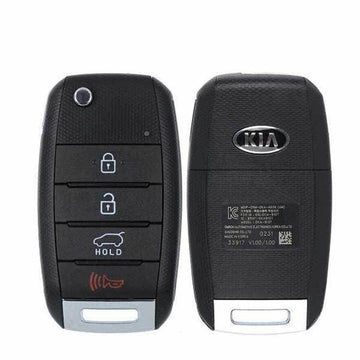What is a Transponder Key and How It Works? - Types & Benefits
by John Alvarado on May 31, 2025

Have you ever wondered why modern car keys cost so much more to replace than traditional metal keys? The answer lies in transponder key technology. These sophisticated keys have revolutionized automotive security since their introduction in the 1990s, dramatically reducing vehicle theft rates worldwide.
A transponder key isn't just a mechanical device to unlock your car it's a critical security component that prevents the engine start without proper authentication. For drivers of any vehicle brand, including Honda, Toyota, Ford, or luxury models, knowing how transponder keys work is crucial for safeguarding their investment.
What Is a Transponder Key?

A transponder key combines traditional mechanical components with electronic security. The term "transponder" comes from "transmitter" and "responder." When inserted into your ignition, these keys don't just physically turn a lock they communicate electronically with your vehicle's computer system.
At the heart of every transponder key is a microchip embedded in the plastic head. This chip contains a unique code that must match the code in your car's immobilizer system. Without this electronic handshake, your car's computer won't allow the engine to start, even if the mechanical key pattern matches.
Unlike traditional metal keys, easily duplicated at hardware stores, a transponder key requires specialized equipment to clone both its physical pattern and electronic signature.
What Is A Transponder Chip Key?
A transponder chip within these keys acts as an anti-theft device, ensuring only authorized access can start your vehicle. Essentially:
-
It contains an RFID microchip inside its plastic head.
-
Communicates with your vehicle’s immobilizer system via radio frequencies.
-
Requires precise matching between its stored code and your vehicle’s ECU for successful ignition.
This technology makes duplicating such keys challenging without proper authorization or equipment
How Do Transponder Keys Work?
What is a car key transponder's operating principle? It relies on Radio Frequency Identification (RFID) technology. Here's the process:
-
When you insert and turn the key, the car's immobilizer sends an electromagnetic signal to the transponder chip.
-
The chip responds by broadcasting its unique identification code.
-
The car's computer verifies this code.
-
If the codes match, the immobilizer deactivates, allowing the engine to start.
-
If not, the system remains locked.
Modern transponder systems use either fixed codes (unchanging) or rolling codes (generating new codes each time). This encrypted communication is what makes a transponder chip key special and difficult to duplicate.
Types of Transponder Keys
Transponder key technology has evolved into several variations:
Basic Transponder Keys
These look similar to traditional keys but contain an embedded RFID chip in the plastic head. They require physical insertion into the ignition and were common in vehicles manufactured between 1995 and 2010.
Switchblade/Flip Keys
These feature a metal blade that folds into the key fob when not in use. The plastic body houses both the transponder chip and often additional remote functions for door locks and alarms.
Smart Keys and Proximity Fobs
The most advanced iteration doesn't require physical insertion into an ignition. These devices:
-
Allow for keyless entry when near the vehicle
-
Permit push-button starting while remaining in your pocket
-
Contains advanced transponders with complex encryption
-
Include additional features like remote start
What is a transponder chip key's advantage here? The technology extends beyond basic security to enable convenience while maintaining protection.
Also Read: 10 Different Types of Car Keys
Benefits of Transponder Keys
Transponder key technology has delivered significant advantages:
Enhanced Security
Vehicle theft rates in the United States have declined by approximately 50% since transponder keys became standard. What makes a transponder key secure is its dual-layer protection:
-
Physical security through the mechanical key pattern
-
Electronic security through encrypted RFID communication
Convenience Features
Beyond security, transponder key technology enables:
-
Remote locking/unlocking
-
Trunk release functions
-
Panic buttons
-
Memory settings for seat positions and climate controls
-
Remote start capabilities
Many insurance companies offer premium discounts for vehicles equipped with this technology, recognizing their effectiveness in preventing theft.
Common Issues and Troubleshooting
Despite their advantages, transponder keys can experience problems:
-
Battery Failures: Advanced keys rely on batteries lasting 2-5 years. Signs of failure include decreased range and intermittent functionality.
-
Transponder Chip Damage: Physical damage can disrupt the chip's functionality while leaving the mechanical key intact.
-
Signal Interference: External radio frequency interference can sometimes disrupt communication.
Most vehicles have emergency procedures to start the car when transponder communication fails, typically involving placing the key in a specific position or using a hidden mechanical override.
Replacing and Programming Transponder Keys
When you need a replacement, options include:
-
Dealership Replacement: Straightforward but expensive ($150-$400)
-
Professional Locksmith: Usually 30-50% cheaper than dealerships ($75-$200)
-
DIY Options: Some vehicles allow owner programming if you have a working key
When buying replacement transponder keys online, ensure exact compatibility with your vehicle and verify whether programming is required.
Lost Your Key Fob or Need a Spare? Browse our extensive collection of keyless entry fobs at Auto KeyTechnology and get back on the road fast.
Summing Up
Transponder keys have revolutionized automotive security by combining physical and electronic components to prevent unauthorized access. Their enhanced security features significantly reduce theft risks, while convenience options like keyless entry and push-to-start systems make them indispensable for modern drivers. As technology advances, we can expect further innovations in vehicle security, such as biometric authentication and smartphone integration.
Understanding transponder keys helps car owners appreciate their value in maintaining both safety and convenience on the road. By investing in this technology, vehicle owners can enjoy peace of mind knowing their cars are well-protected against theft attempts.




